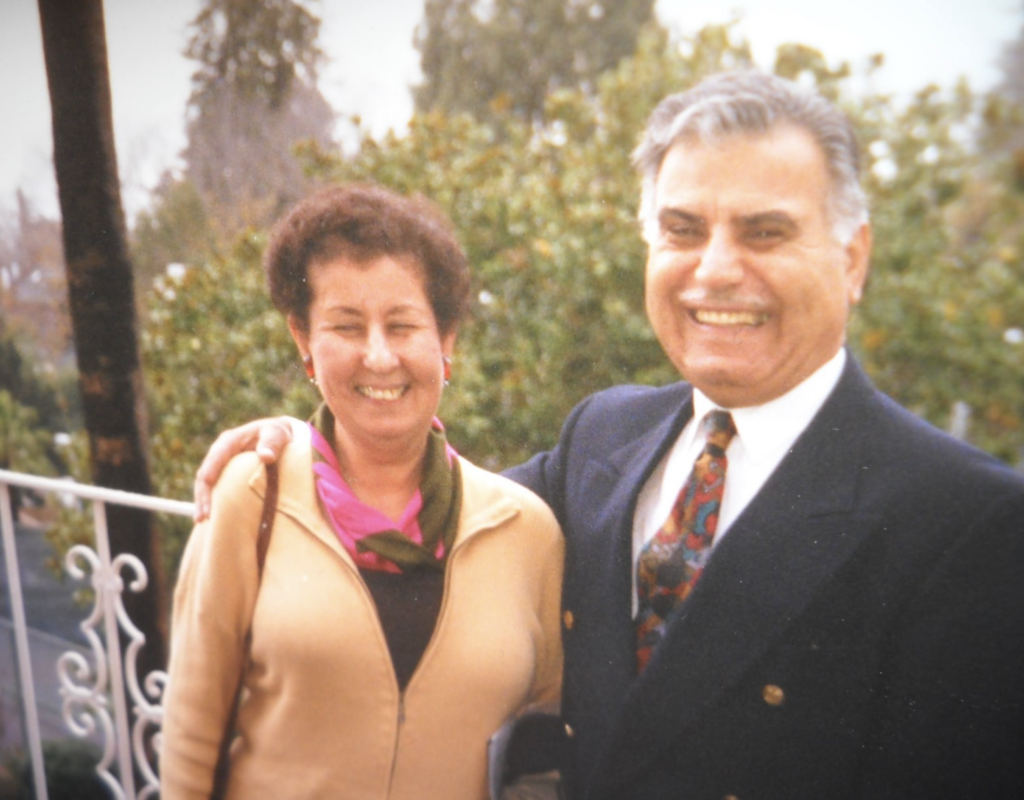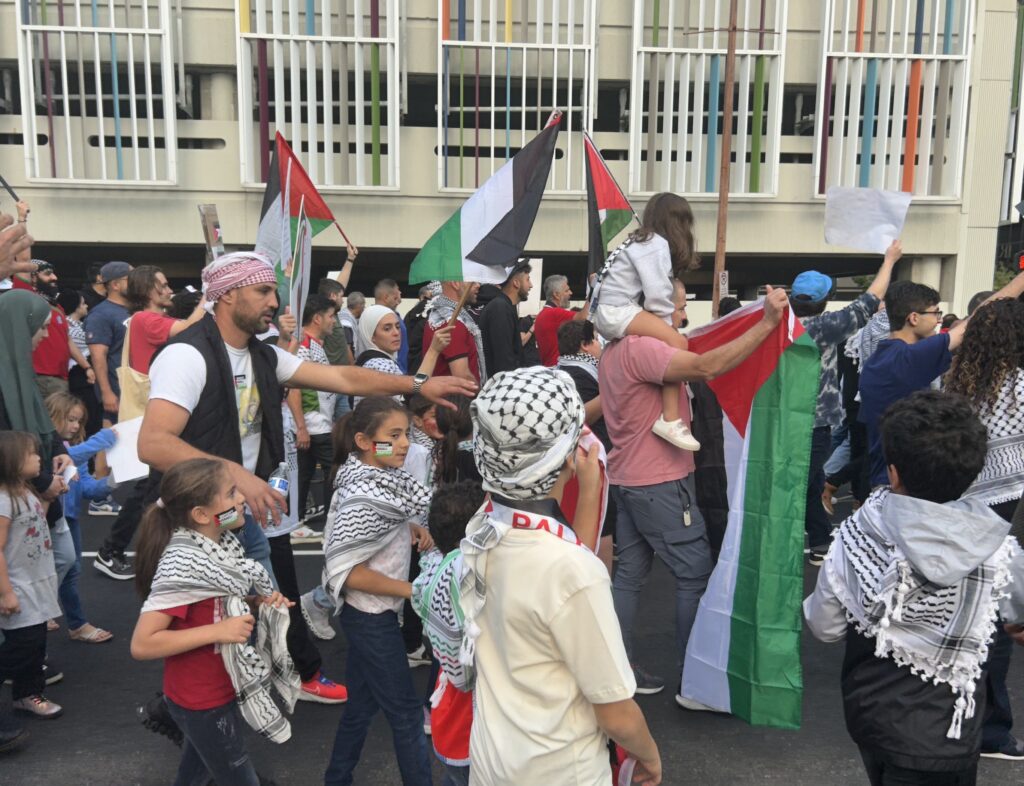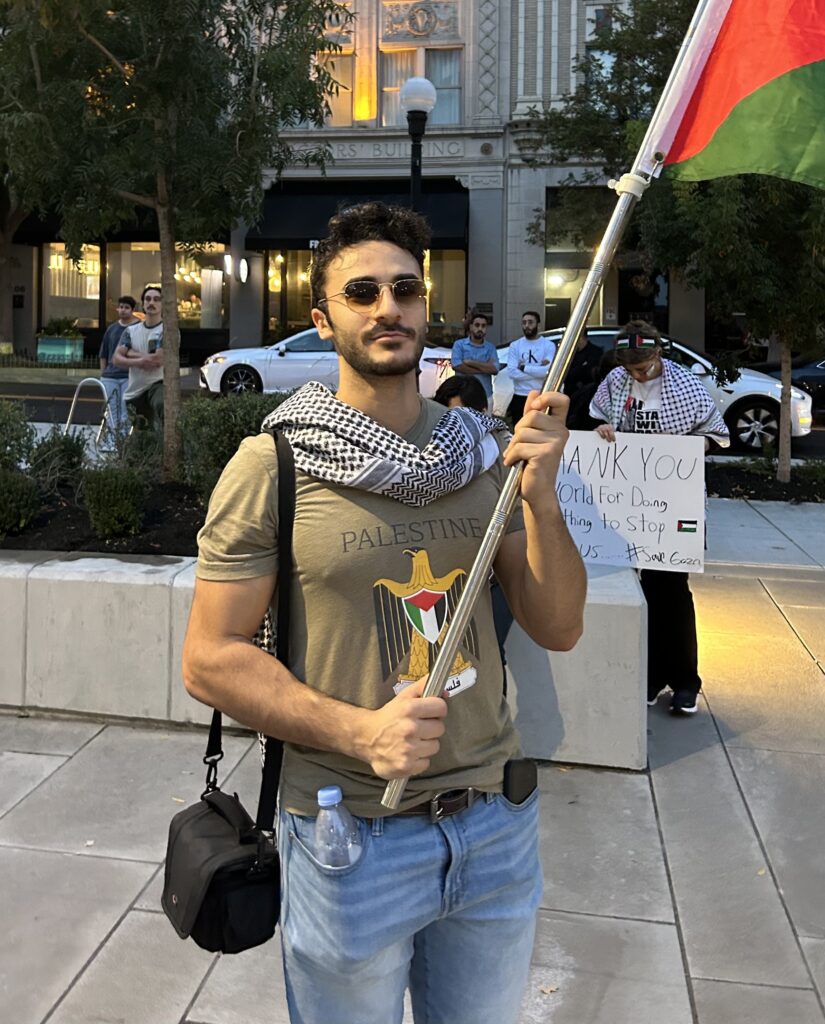
Over the past several weeks, the escalating conflict in Gaza has pushed many in Middle Tennessee’s Palestinian community to be more vocal about their history and experiences.
Dr. Abdallah M. Isa and Laila Fadda Isa have been married for more than 60 years. They met and fell in love in Beirut, Lebanon, and danced to “Ya Zahratan Fe Khaialy” by Farid al-Atrash on their wedding night. They’ve lived in Nashville for decades. But they were both born in northern Palestine, where they lived until their families were forced to flee by the Israeli army in 1948.
Dr. Isa was a teenager when his family left.
“We ran across the mountains to Lebanon, hiding behind boulders to avoid being hit by the machine gunfire,” he said.
His family’s harrowing departure was part of what Palestinians remember as the “Nakba,” which means “the catastrophe” in Arabic. Between 1948 and 1949, more than 700,000 Palestinians were permanently displaced by the Israeli army — over half of the population, according to the United Nations.
But let’s back up for a second.
Partition, displacement and the birth of the conflict
After the horrors of the Holocaust, during which Nazi Germany killed some six million Jewish people, there was a movement to create a Jewish state.
The choice was Palestine, then under British control, which was home to Christian, Muslim, and Jewish populations. Over the course of the 1930s, many Jewish refugees fled to Palestine to escape increasingly brutal persecution in Europe.
In 1947, the United Nations partitioned Palestine into two states, one of which became Israel. Many of the surrounding Arab countries objected to the partition and the displacement of Palestinian people. War soon broke out between Israel and several neighboring states.
That brings us back to 1948, when Laila’s family fled, not knowing they wouldn’t be able to return.
“My mom’s dentist in Haifa was Jewish, so my dad called him and he said, ‘We need to pay you. You know, I have to pay you.’ He said, ‘Don’t worry, you’ll pay me when you come back.’ Of course, we never went back,” Laila said.
Laila grew up in a home with multiple generations of her family including grandparents, uncles, aunts, cousins, parents and siblings. She remembers the house’s tall glass windows, and the gardens with pools full of fish and trees full of figs, lemons, oranges and pomegranates.
Years later, she learned her family’s home and gardens had been demolished and replaced by a courthouse.
“It is all up here,” she said, tapping a finger to her temple, “I remember every single room, every single tree that was in that garden. We had the largest fig trees in the whole town.”
‘I have a responsibility, a duty to talk about it as Palestinian living in America.’
Laila and Dr. Isa’s stories are familiar to Dr. Nahed Artoul Zehr, whose grandmother’s family was evicted from their home during the Nakba. Zehr was born to a Christian Palestinian family in Israel but has spent most of her life in the United States.
“Talking about the Palestinian-Israeli conflict is always really challenging. And, to be honest, for years I have avoided it as much as possible,” she said.
But she said the past few weeks changed everything.
On Oct. 7, Hamas attacked Israel. About 1,400 people were killed, and more than 220 hostages were abducted, according to the Israeli government.
Israel retaliated with heavy airstrikes on the Gaza Strip. More than 8,000 people have been killed — including at least 3,000 children — according to the Gaza Ministry of Health.
Zehr wrote an op-ed for the Tennessean, calling for the protection of the human rights of Palestinians and Israelis and urging people to learn about the history of the conflict.
“I was happy to say that I condemn what Hamas did. I absolutely do. It was a horrific thing … it was like a crime against God,” she said. “I can’t leave it there, though.”
“I have a responsibility, a duty to talk about it as a Palestinian living in an America … certainly from my perspective, the Palestinian point of view is vastly underrepresented,” she explained.
Zehr said it’s crucial not to dehumanize Palestinians or Israelis when discussing the conflict, and added that she grieves for everyone involved. She also said that she wishes people understood the “gravity of the situation for the Palestinians,” as well as what it means to be “stateless.”
“Palestinians do not have a state. They don’t have any type of real government. They have very little agency over their own lives. We have people who are in a desperate situation. And I would say the Israelis are in a desperate situation, too — I mean, this is a state that is oftentimes at war with its neighbors. Everyone’s in a desperate situation,” she said.
 Rose Gilbert WPLN News
Rose Gilbert WPLN News Demonstrators in downtown Nashville called for a ceasefire and voiced their outrage at civilian deaths in Gaza.
Shifting borders
Since Israel first declared independence in 1948, Palestinian territory has shrunk dramatically to just the West Bank and the Gaza Strip.
The West Bank has been under occupation by the Israeli military since the 1967 Arab-Israeli war, or the Six-Day War, between Israel and a coalition of neighboring states. The Gaza Strip is a small, coastal piece of land — about one-quarter of the size of Davidson County — and home to more than two million Palestinians, about half of whom are children. It has been under blockade for 16 years, which means people living there cannot easily leave.
“What I wish people knew about the Palestinian perspective is that we feel like we have been erased in some respect,” said Zehr. “To lose the tiny bit of land that you do have feels like the final nail in the coffin.”
Since the beginning of the Israel-Hamas war, there have been weekly rallies in Nashville in support of Palestine. Demonstrators have called for a ceasefire as Israeli airstrikes on Gaza continue with a rising civilian death toll.
 Rose Gilbert WPLN News
Rose Gilbert WPLN News Abdul Alsoub, 24, has been a regular at rallies to support Palestine in Nashville over the past three weeks.
Abdul Alsoub, a twenty-four-year-old whose mother is Palestinian, has been a regular at these rallies and says he’s seen massive participation from young people.
“I’ve noticed that the kids of this generation are way more passionate and loud about it. I feel our parents feel like they have to hide their identity and might be scared to say it because of safety reasons. But our generation isn’t,” he said.
And Alsoub says that participation takes place both in-person and online.
“More people are getting aware. The protests are getting bigger. And I think social media is the reason, because people are able to post their own videos that they’re taking on the ground in Gaza or Palestine,” he said.
Dr. Isa and his wife Laila say they’ve never seen this level of widespread support for Palestinian people in America.
“People all over the world now are demonstrating everywhere, even in Washington, D.C. — even in Nashville, Tennessee,” said Dr. Isa.
And they say that gives them hope for the future.

